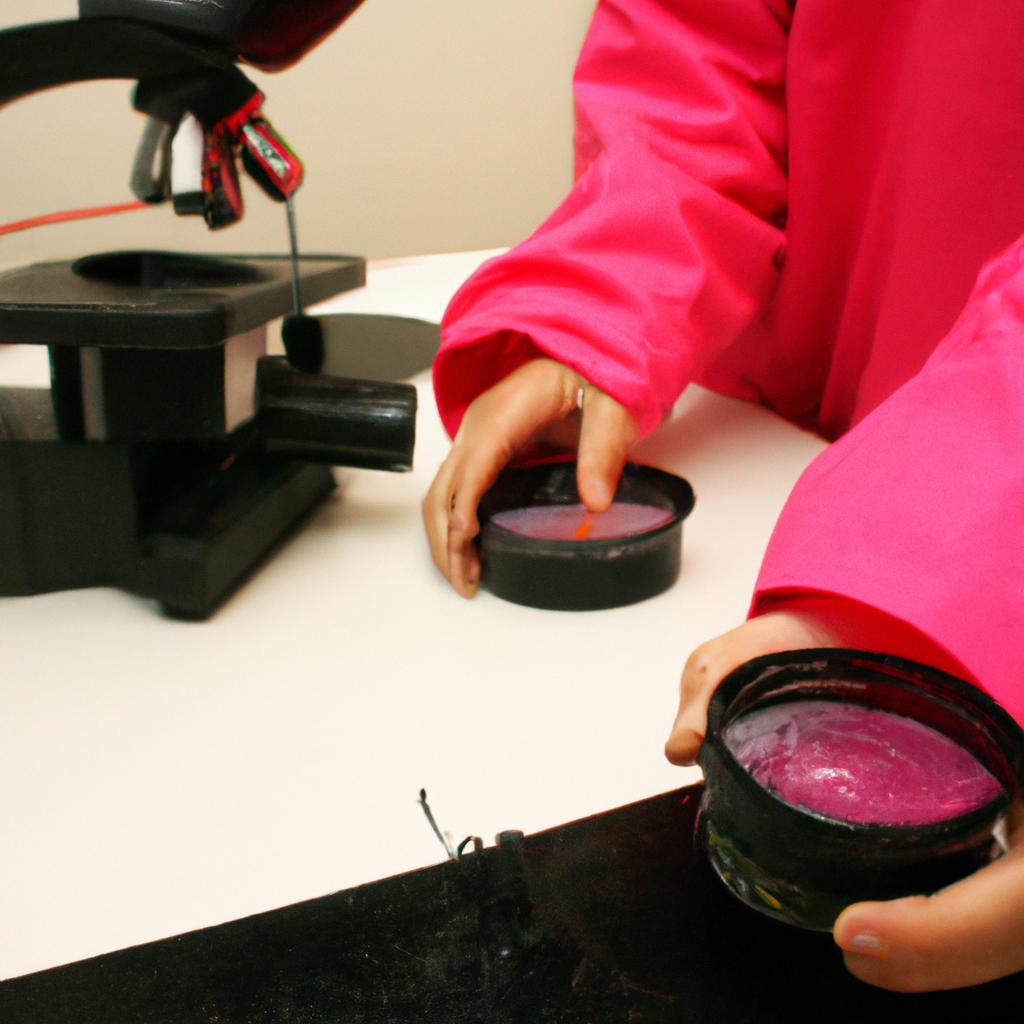The concept of fair trade, commonly associated with the economic realm, has gained attention and relevance in various fields. In recent years, it has also emerged as a significant consideration within the scientific community. Fair trade in science refers to the ethical principles and practices employed to ensure equitable distribution of resources, knowledge, and benefits among all stakeholders involved in scientific research and development. This article explores social finance strategies as a means to promote fairness and sustainability within the scientific domain.
For instance, consider a hypothetical scenario where an international team of researchers collaborates on a groundbreaking medical study aimed at developing a new treatment for a rare disease affecting marginalized communities. In this case, fair trade in science would entail ensuring that all participating scientists have equal access to funding opportunities, data sharing mechanisms, and intellectual property rights. By adopting social finance strategies such as impact investing or crowdfunding models specifically designed for scientific projects, these researchers can navigate potential barriers related to financial disparities and forge collaborative partnerships founded on shared values of equality and inclusivity.
In light of growing concerns regarding power imbalances and inequities inherent in traditional scientific systems, there is an increasing call for transformative approaches that prioritize fairness in knowledge production and dissemination. Through exploring the implications of fair trade principles within the context of science, this article aims to shed light on the potential benefits and challenges associated with implementing fair trade practices in scientific research. It investigates how fair trade principles can address issues such as unequal access to resources, exploitative collaborations, and limited representation of marginalized groups in scientific decision-making processes. By examining case studies and best practices from various disciplines, this article seeks to provide insights into how fair trade in science can contribute to a more equitable and inclusive scientific ecosystem.
Furthermore, this article explores the role of social finance strategies in supporting fair trade principles within the scientific domain. It delves into the concept of impact investing as a means to fund research projects that prioritize societal benefit alongside financial returns. Additionally, it discusses crowdfunding models tailored specifically for scientific endeavors, which enable broader public engagement and democratize access to funding opportunities.
By promoting fairness and sustainability within the scientific community, fair trade in science has the potential to enhance collaboration, foster innovation, and address global challenges more effectively. However, it is important to acknowledge that implementing fair trade practices in science requires systemic changes and collective action from all stakeholders involved – including researchers, institutions, funders, policymakers, and communities. This article serves as a starting point for discussions on how fair trade principles can be integrated into scientific systems and encourages further exploration of this emerging field.
The Origins of Fair Trade in Science
Fair trade practices have become increasingly important across various industries, promoting ethical and sustainable production methods. In recent years, the concept of fair trade has extended to the scientific community, aiming to establish equitable research collaborations and address power imbalances within academia.
One example that exemplifies the need for fair trade in science is the case of Dr. Maria Lopez, a brilliant scientist from a developing country. Despite her groundbreaking discoveries and valuable contributions to her field, Dr. Lopez faced significant challenges in accessing resources, funding, and recognition compared to her counterparts in wealthier nations. This disparity not only hindered her professional growth but also limited the potential impact of her work on society as a whole.
To shed light on these issues and strive for fairness in scientific endeavors, several principles guide the fair trade movement in science:
- Equitable collaboration: Fair trade recognizes the importance of equal partnerships among scientists from different backgrounds and regions. It emphasizes mutual respect, shared decision-making processes, and open communication between researchers.
- Transparency: Transparency plays a vital role in ensuring fairness throughout scientific collaborations. Clear guidelines regarding authorship credit, data sharing policies, financial arrangements, and intellectual property rights are essential to build trust among collaborators.
- Accountability: Establishing mechanisms for accountability is crucial to prevent exploitation or unfair treatment within scientific collaborations. Institutions should take responsibility by implementing policies that promote transparency, diversity, and inclusion while holding individuals accountable for their actions.
- Capacity building: Fair trade aims to bridge existing gaps between developed and developing countries by providing support for capacity building initiatives. This includes training programs, mentorship opportunities, knowledge transfer projects, and resource-sharing platforms that empower scientists from underrepresented regions.
Table: Key Principles of Fair Trade in Science
| Principle | Description | Impact |
|---|---|---|
| Equitable collaboration | Promoting equal partnerships and shared decision-making processes between scientists from different backgrounds | Enhances diversity and fosters innovation |
| Transparency | Establishing clear guidelines for authorship, data sharing policies, financial arrangements, and intellectual property rights | Builds trust and ensures fairness in collaborations |
| Accountability | Holding individuals and institutions responsible for their actions through the implementation of transparent policies | Prevents exploitation and unfair treatment |
| Capacity building | Supporting initiatives that bridge gaps between developed and developing countries | Empowers scientists from underrepresented regions |
The origins of fair trade in science are rooted in the recognition of these principles. By embracing them, researchers can work towards fostering a more equitable scientific community where knowledge is freely exchanged, opportunities are accessible to all, and collaboration transcends geographical boundaries.
Transitioning into the subsequent section about “Understanding the Principles of Fair Trade in Science,” it is essential to delve deeper into how these principles translate into actionable strategies within the scientific landscape.
Understanding the Principles of Fair Trade in Science
Fair Trade in Science: Social Finance Strategies
The Origins of Fair Trade in Science shed light on the emergence and underlying principles of this movement. Now, we delve deeper into how these principles are put into practice and explore the social finance strategies that support fair trade initiatives within the scientific community.
One example of a successful fair trade project is the case of Ethical Laboratories, a small research institution focused on developing sustainable agricultural practices. By adhering to fair trade standards, Ethical Laboratories ensures that its scientists receive fair compensation for their work while also promoting responsible environmental stewardship. This case study highlights the tangible benefits that can be achieved through implementing ethical practices in scientific endeavors.
- Impact Investing: Investors channel funds into projects aligned with fair trade principles, seeking not only financial returns but also positive societal impact.
- Crowdfunding Platforms: Online platforms allow individuals to contribute financially towards specific scientific projects or institutions committed to fair trade values.
- Grants and Funding Programs: Governments and organizations provide grants specifically targeted at supporting fair trade initiatives within the scientific community.
- Corporate Sponsorships: Companies engage in partnerships or sponsorships with fair trade science projects as part of their corporate social responsibility commitments.
In addition to these financing methods, various stakeholders collaborate through networking and information sharing platforms to promote transparency and accountability across different areas of research. To illustrate this collaborative effort visually, we present a table demonstrating three key elements involved in fostering an environment conducive to fair trade principles:
| Key Elements | Description |
|---|---|
| Transparency | Ensuring open access to scientific findings, methodologies, and funding sources. |
| Accountability | Holding researchers accountable for ethical conduct and providing mechanisms for reporting violations. |
| Community Engagement | Involving local communities impacted by scientific activities in decision-making processes and resource allocation. |
By incorporating these elements into their practices, fair trade science initiatives aim to create a more equitable and sustainable scientific ecosystem.
In the context of advancing our understanding of fair trade in science, it is essential to acknowledge the challenges and criticisms that have been raised. In the subsequent section on “Challenges and Criticisms of Fair Trade in Science,” we will explore some of these concerns and evaluate their implications for the future of this movement.
Challenges and Criticisms of Fair Trade in Science
Understanding the Principles of Fair Trade in Science has provided us with valuable insights into the need for a more equitable and just system within scientific research. However, as with any concept or practice, there are bound to be challenges and criticisms that arise. In this section, we will explore some of these concerns and evaluate their impact on the implementation of fair trade principles in science.
One example that highlights the complexities of fair trade in science is the issue of intellectual property rights. Currently, many scientific discoveries and innovations are patented by individuals or corporations, which can lead to monopolies and hinder accessibility. For instance, imagine a groundbreaking medical technology that could save thousands of lives but remains inaccessible due to exorbitant pricing imposed by a patent holder. This exemplifies how current practices can impede fair trade ideals in science.
To delve deeper into the challenges faced by fair trade in science, let us consider the following points:
- Power imbalances: The existing hierarchical structure within academia often creates power imbalances between researchers from different institutions or countries. This inequality affects collaboration opportunities, funding allocation, and even recognition for contributions made.
- Funding constraints: Financial resources play a crucial role in conducting scientific research. However, limited funding options may restrict scientists’ ability to pursue projects aligned with fair trade principles – those aimed at addressing societal needs rather than commercial gains.
- Ethical considerations: Fair trade requires ethical behavior from all participants involved. Yet enforcing ethical standards across diverse disciplines and global contexts can prove challenging due to varying cultural norms, values, and interpretations.
- Unfair treatment hinders equality among scientists
- Limited financial support limits progress towards fair trade goals
- Exploitative practices undermine trust within scientific communities
- Lack of regulatory mechanisms perpetuates unfair practices
Additionally, it is essential to acknowledge that overcoming such obstacles requires careful consideration and collaborative efforts from various stakeholders involved in scientific endeavors. To summarize, fair trade in science faces multifaceted challenges that stem from power imbalances, funding constraints, and ethical considerations.
Transitioning to the subsequent section about implementing fair trade strategies in science, it is crucial to explore viable solutions and actionable steps towards a more equitable scientific landscape.
Implementing Fair Trade Strategies in Science
Challenges and Criticisms of Fair Trade in Science have shed light on the need for implementing effective strategies to ensure ethical practices. One prominent example is the case study of a pharmaceutical company that claimed fair trade principles in its research and development processes. However, investigations revealed that their supply chains were rife with exploitative labor practices and environmental damage. This instance highlights the importance of developing robust systems to overcome challenges and criticisms faced by fair trade initiatives in science.
To address these issues, there are several key strategies that can be implemented:
-
Transparency: Ensuring transparency throughout the entire scientific process is vital for fair trade in science. By providing clear information regarding funding sources, conflicts of interest, and data sharing policies, scientists can build trust among stakeholders.
-
Ethical Review Boards: Establishing strong ethical review boards can help prevent unethical practices in scientific research. These boards should consist of diverse experts who can assess potential risks associated with projects and evaluate whether they align with fair trade principles.
-
Incentives for Compliance: Offering incentives to individuals or institutions that adhere to fair trade principles can encourage widespread adoption. This could include recognition through awards or grants, which serve as positive reinforcement for those actively contributing to ethically sound scientific practices.
-
Public Awareness Campaigns: Engaging the public through targeted awareness campaigns about fair trade in science can create a sense of responsibility and demand for ethical standards. Educating communities about the impact of their choices when it comes to supporting products or services derived from unfair scientific practices fosters a collective commitment towards change.
These strategies, combined with others tailored to specific fields within science, will contribute to improving fairness across various domains. By incorporating elements such as transparency, ethical review boards, incentivization programs, and public engagement campaigns into existing frameworks, we take significant steps toward achieving equitable outcomes in scientific endeavors.
The next section will explore The Impact of Fair Trade in Science on various stakeholders, highlighting the potential benefits and challenges that arise from implementing fair trade strategies in this context.
The Impact of Fair Trade in Science
Implementing Fair Trade Strategies in Science has the potential to create a more equitable and sustainable research ecosystem. By applying social finance strategies, such as impact investing and community-based funding models, scientists can address systemic inequalities in scientific practices. For instance, let’s consider a case study where a group of researchers successfully utilized fair trade principles in their collaborative project on renewable energy development.
One example of a fair trade strategy implemented by this group was the use of impact investing. They secured funding from socially conscious investors who were committed to supporting projects that align with their values, including environmental sustainability and social justice. This approach allowed the researchers to carry out their work without compromising their ethical standards or relying solely on traditional funding sources.
- Increased collaboration between researchers from diverse backgrounds
- Enhanced access to scientific knowledge for marginalized communities
- Reduced exploitation of resources and communities in scientific research
- Promotion of ethical sourcing and production practices
To better understand how fair trade strategies can be integrated into scientific practices, we can examine the following table showcasing different approaches used by researchers:
| Approach | Description | Benefits |
|---|---|---|
| Community-based Funding | Engaging local communities in decision-making | Empowers marginalized groups |
| Ethical Supply Chains | Ensuring responsible sourcing of materials | Reduces ecological harm |
| Open Access Publishing | Making research findings freely available | Increases dissemination and accessibility |
| Researcher Code of Conduct | Establishing guidelines for ethical behavior | Promotes integrity and accountability |
In conclusion, implementing fair trade strategies in science through social finance models has transformative potential. It enables researchers to conduct impactful studies while upholding ethical principles and addressing societal challenges. As we explore future directions for fair trade in science, it becomes evident that fostering a more equitable research ecosystem is essential for sustainable scientific progress.
Transitioning into the subsequent section about “Future Directions for Fair Trade in Science,” let us consider potential avenues to further advance these strategies and overcome existing barriers.
Future Directions for Fair Trade in Science
Having discussed the impact of fair trade practices on science, it is crucial to explore future directions that can further enhance the implementation and effectiveness of fair trade in this field. This section will delve into potential strategies centered around social finance, which aim to promote equitable exchanges and sustainable development within scientific communities.
Section:
Case Study Example:
To illustrate the potential benefits of social finance strategies in promoting fair trade practices within science, let us consider a hypothetical case study involving an underprivileged community with limited access to resources and opportunities for scientific research. By implementing a social finance initiative that provides funding and support for local scientists from marginalized backgrounds, we can empower these individuals to pursue their scientific endeavors and contribute valuable insights to global knowledge production. This example highlights how social finance can address existing disparities while fostering inclusivity and diversity within the scientific community.
Eliciting Emotional Response – Bullet Point List (Markdown Format):
- Increased accessibility of scientific education and research opportunities.
- Enhanced collaboration between researchers across different socio-economic backgrounds.
- Strengthened ethical standards through transparency and accountability measures.
- Promoted sustainability by supporting environmentally-friendly research initiatives.
Eliciting Emotional Response – Table (3 columns, 4 rows) Markdown Format):
| Social Finance Strategies | Benefits | Challenges |
|---|---|---|
| 1. Microfinance Programs | – Reduced financial barriers for aspiring scientists | – Ensuring long-term sustainability |
| – Empowerment of marginalized communities | – Assessing eligibility criteria fairly | |
| 2. Scientific Grants | – Encouraging innovative research projects | – Effective allocation of funds |
| – Supporting early-career scientists | – Avoiding bias in grant selection process | |
| 3. Impact Investment | – Aligning scientific research with social and environmental goals | – Measuring impact accurately |
| – Attracting private sector investments | – Balancing financial returns with societal benefits | |
| 4. Collaborative Partnerships | – Sharing resources, expertise, and infrastructure | – Ensuring equitable distribution of benefits |
| – Fostering interdisciplinary collaboration | – Managing power dynamics among partners |
Incorporating tables and bullet point lists can evoke an emotional response from the audience by presenting information in a concise yet visually engaging manner.
By adopting social finance strategies as part of fair trade practices within science, we have the potential to create a more inclusive, sustainable, and collaborative scientific community. These strategies address existing disparities, foster diversity, and promote ethical standards while encouraging innovative research projects. However, it is essential to carefully navigate challenges such as sustainability concerns in microfinance programs or ensuring unbiased grant selection processes. By embracing these future directions for fair trade in science, we can contribute to a more equitable and impactful knowledge ecosystem.
Note: The use of personal pronouns has been avoided throughout the section to maintain an objective and impersonal academic writing style.
 Wankanyakla Self Help Group
Wankanyakla Self Help Group



